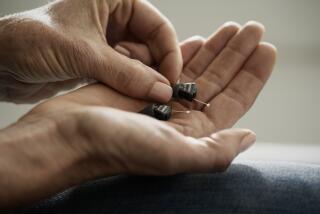For too long he tuned out
- Share via
Bruce McClymonds couldn’t believe his ears.
In a meeting, a colleague confided that his daughter had been missing for three days, and he wasn’t sure another search would be mounted. The director nodded sympathetically but motioned to proceed with the agenda. Astonished, McClymonds rose from his chair and exclaimed: “Wait a minute! We’ve got to get out of this room right now and start looking for his daughter.” The dramatic appeal drew nothing but laughter.
“Dog!” corrected another colleague. “Not daughter.”
For years, the furniture store owner had known his hearing was bad. He couldn’t count the times he had asked someone to repeat something, had misunderstood what someone said or didn’t hear anything at all.
But even this dramatic reminder wasn’t enough to make him do something about it. McClymonds, now 48, was hardly alone in denying his hearing loss. Of the estimated 28 million Americans who have some level of hearing loss, fewer than a fifth of those ever seek treatment, according to the Better Hearing Institute, a Washington D.C.-based organization of hearing aid manufacturers and suppliers.
“Our society has a real stigma attached to hearing loss,” said Alison Grimes, director of audiology at Providence Speech and Hearing Center in Orange. “People associate it with aging and senility. They think if you have it you’re basically out to lunch.”
It’s true that the risk of hearing loss rises significantly with age. While roughly 10% of 40-year-olds suffer from some form of hearing impairment, nearly 40% experience it by age 65, according to the American Academy of Audiologists. And with nearly 80 million baby boomers marching toward senior citizen discounts, the ranks of the hearing-impaired are expected only to grow in the coming decades.
Researchers still don’t know exactly why age can diminish hearing. Some research suggests that, over the years, microstructures within the ear gradually lose blood flow, while others may simply have a genetic predisposition to the problem. One thing is certain: Prolonged exposure to loud noise will damage hearing.
*
Sang in a rock band
“Without a doubt, whether it’s a loud factory or loud music, noise is the biggest external factor,” said Grimes. “And once the ear is damaged, it’s permanent.”
McClymonds of Fountain Valley knows precisely how he damaged his hearing. He used to be the lead singer for a rock ‘n’ roll band that favored songs by groups such as Queen and Led Zeppelin. Unlike band members positioned behind the speakers and thus spared some of the ill effects of the loud music, McClymonds bore the brunt of the immense sound.
“The volume was so high it could give you a nosebleed,” said McClymonds, who sang for four years during his 20s.
A steady flow of excuses, many born of denial, kept him from facing the problem. “From a vanity standpoint,” he said, “I didn’t want to feel like I was getting older.”
Finally, a group of co-workers, friends and loved ones tricked him into getting an exam last summer. They scheduled a phony business meeting that actually turned out to be a hearing test with Grimes. “It surprised me,” said McClymonds. “But I thought it was fantastic they cared enough about me to arrange it.”
Grimes first asked McClymonds about his health and background, then physically checked his ears to make sure his eardrums were intact and there wasn’t an infection. Next, while McClymonds was seated in a soundproof booth, he was tested for his ability to hear tones at varying frequencies and intensities, and to recognize and distinguish words. The entire exam took about an hour.
The results weren’t surprising. McClymonds had what was termed a moderate hearing loss: 60% loss in his right ear, 55% in his left.
Then, Grimes had him try on a bulky hearing aid, an older model that fit conspicuously on the outside of the ear -- exactly what he had feared. But he soon put aside his qualms when he heard what he had been missing. “It was like a rebirth,” he said. “All of a sudden, I found out that the buttons on a computer keyboard made noise when someone was typing. I heard the water in the drinking fountain. I heard the leaves blowing in the trees.... At that point, I didn’t care what the hearing aid was going to look like, I was going to wear one.”
Still, hearing aids aren’t necessarily for everyone with hearing loss, said Grimes. People with low hearing loss probably can function fairly well without them. It largely depends on your personal circumstances, she said. Face-to-face talking and learning to read lips can make up some of the gap in hearing.
*
Lifestyle affects need
“If you’re a trial attorney and you need to hear every word, hearing aids are probably a good idea,” said Grimes. “But if you’re a farmer in South Dakota and you ride a tractor all day and live alone, you probably don’t need one.”
Cost is another consideration, because most health plans do not cover hearing aids. They range from about $700 for the older, bulkier analog models to as much as $3,000 for the small digital ones that fit inside the ear.
Today, McClymonds wears two small digital hearing aids that almost always go undetected. Other than changing the batteries every three to five days (a pack of 40 batteries runs about $21), they require little maintenance.
“It takes some getting used to, hearing everything again,” said McClymonds. “It takes a while for your mind to sort out what’s important and what’s not. The good news, though, is when you don’t want to hear something, you can just pull them out.”





